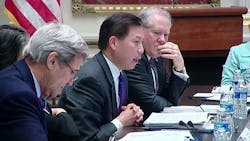Anti-slavery Supply Chain Measures Announced by US Government
Jan. 25, 2016
2 min read
At the annual meeting of the President's Interagency Task Force to Monitor and Combat Trafficking in Persons (PITF), held earlier this month, the U.S. government outlined measures that are being taken to address human trafficking in supply chains.
The task force was set up in 2013, with one of the four priorities being a review of the procurement and the supply chain process.
At the most recent meeting a number of specific initiatives were taken which include:
- Working at the nexus of business and human rights, USAID has pioneered a new initiative called Supply Unchained to better identify and counter human trafficking in supply chains. USAID is partnering with an NGO in India to create a model for identifying human trafficking cases in the lowest tiers of global supply chains, and also with the Issara Institute to create a mobile application for Burmese migrant workers to better connect and share information to counter human trafficking risks in Thailand’s export-oriented seafood supply chains.
- The Department of Defense, in April 2015, held its largest ever Operational Contract Support Exercise that evaluated current policies aimed at combating human trafficking via the supply chain in U.S. Pacific Command’s area of responsibility. The Department is planning a similar exercise this April for U.S. Southern Command.
- •As discussed at the January 2015, White House Forum on Combating Human Trafficking in Supply Chains, the Federal Acquisition Regulatory Council will soon release the proposed rule for public comment through a federal register notice for a government-wide definition for recruitment fees. The definition will provide greater clarity and help ensure federal contractors and other companies are successful in addressing human trafficking concerns in their supply chains.
- The recently concluded Trans-Pacific Partnership negotiated by the Office of the U.S. Trade Representative includes enforceable obligations on labor rights, including on the elimination of forced labor and to address trade in goods produced by forced labor, and specifically targets trafficking concerns in trading partners, such as Malaysia, by requiring reforms in law and practice to better protect vulnerable populations and to prosecute traffickers.
- Additionally, the State Department this month will launch an online resource, ResponsibleSourcingTool.org, to strengthen protections against forced labor in federal and global supply chains.
Material Handling & Logistics is an IndustryWeek companion site within Penton's Manufacturing & Supply Chain Group.
About the Author
Sign up for our eNewsletters
Get the latest news and updates
